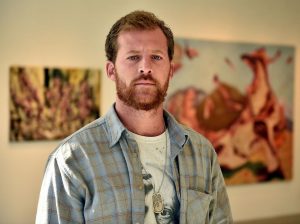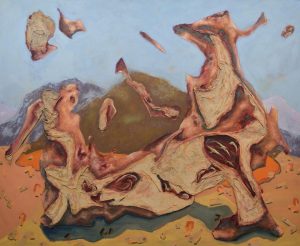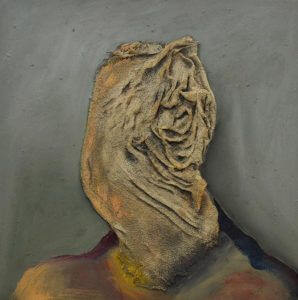In the News | The power of art: Jacob Cullers’ paintings reflect on war and the death of his brother
(The Day, November 3, 2016) When his older brother, 28-year-old Ari Cullers, was killed while serving in the U.S. Army in Afghanistan in 2011, Jacob Cullers was bereft.
Rocked by grief and anger, Jacob channeled his emotions into something that was still relatively new to him then: his art.

Artist Jacob Cullers stands in the gallery at Three Rivers Community College where his work is on display in a show titled “Castles Made of Sand.” Cullers’ brother, U.S. Army Staff Sgt. Ari Cullers, was killed by enemy fire in Afghanistan in October of 2011. (Sean D. Elliot/The Day)
“Really the only good thing that came from it is that I did have painting at the time to express how I felt. It’s been an ongoing process and struggle with it,” says Cullers.
“I always say, ‘Paint or die.’ That’s my motto. If I didn’t have painting at the time of my brother’s death, I don’t know where I would be right now.”
The Cullers siblings grew up in Waterford, and, like his brother, Jacob went into the military. While Ari was in the Army, Jacob spent four years serving in the Air Force and was stationed at Camp Bucca, the largest detainee facility in Iraq.
After Jacob returned to the U.S. in 2009, he became a student at Three Rivers Community College and was particularly enthused about his art classes.
“I was fascinated with the Post-Impressionists and the application of paint and color, and I was just filling my mind up with as much information as possible,” he says.
When Ari, an Army staff sergeant, was killed by a rocket-propelled grenade in Kandahar province, Jacob was compelled to turn his thoughts and emotions about that loss and about circumstances surrounding war into paintings.
“My work has always been influenced by my experience and by the loss of my brother. Granted, each picture might not be a direct representation of the experience, but it all — the politics, the abstract nature of war, all that — is in the work,” he says.

“Rockets Red Glare,” a painting by Jacob Cullers (Contributed)
Cullers, now 30, is displaying his evocative paintings in an exhibition running through Dec. 2 in The Gallery at Three Rivers Community College. There is an opening reception from 6 to 9 p.m. Friday, Nov. 4.
Cullers has focused on art for the past few years. He received his bachelor’s degree in fine art and painting from the University of Hartford, where he minored in art history. He then went to the Glasgow School of Art in Scotland to earn his Master of Letters in fine art, specializing in painting. Cullers returned from Scotland in September of this year and now lives in New London.
The exhibition at Three Rivers, titled “Castles Made of Sand,” is Cullers’ first solo show, and it also marks the first time these particular pieces have been displayed in the States.
The Gallery at Three Rivers is a small, airy space with one wall of windows letting in light. Cullers’ paintings provide a vivid counterpoint, swirling with emotion and angst.
Pieces from his “Casualty” series are grouped on one wall, each focusing on a human head, but it’s all eerie abstraction. Without recognizable features, the figures are ghostly and unsettling.
In one, a piece of cloth hangs in folds over the face, suggesting, depending on the viewer’s perspective, perhaps skin or bandages or the bags put over detainees’ heads.

A piece from Jacob Cullers’ “Casualty” series; oil on canvas (Contributed)
“For me, these represent the casualties in the war, whether it be the innocent civilians, whether it be the military member, whether it be the suicide bomber. It’s almost like they’re stuck in this obscure reality, almost like a purgatory,” Cullers says.
In some ways, Cullers prefers not to explain what he was thinking in creating his art. He’d rather that viewers find their own meaning in each piece.
Even so, he’s willing to discuss his inspiration when asked. Across the gallery from the “Casualty” series, an epic work titled “Rockets Red Glare” is abstract but suggests a main form and then fragments in the air around it.
“My brother was hit with a rocket-propelled grenade … so, basically, yeah, that’s my brother. You’ve got to be vulnerable in your work, and I think when you are vulnerable, that’s when the best work happens,” he says.
Cullers says that for every painting he creates, his brother is always in the back of his mind.
“You could say subconsciously from the mind to the hand to the painting, it all influences each other, and he is there in every brush stroke and in the process of creation,” he says.
When Ari died, Jacob was angry and found himself asking who was to blame.
“As time went on, I was able to channel my voice into painting and really speak about things I want to speak about — the politics and greed behind war, how much money they (entities like big business and contractors) made, and I started looking at the bigger picture. People were saying, ‘Your brother died for this country,’ and I started thinking, ‘Is the United States worth dying for, is it worth my brother to lose his life about?’”
He reflects on the invasion of Iraq and the number of people killed on both sides, and he says the amount of loss of life compared to the reasons for the war don’t add up.
“That’s what my work is trying to address — kind of war against war, showing both sides of the casualties of the war machine. It’s not worth it,” he says.
When Cullers arrived at Camp Bucca, it housed about 22,000 detainees who were suspected terrorists. (The camp was a place where the most radical jihadists were grouped together and where they joined forces and formed the basis of what would become ISIS.)
“I got to see the broader picture of us basically caging them up and putting them in a compound. A lot of them are innocent, but if they didn’t hate Americans before, they certainly did afterwards,” he says.
At the same time, Cullers is proud of his military service, and he’s glad he went to Iraq.
He actually followed Ari into the military and says one of the reasons he joined was “I was messing up in high school, doing drugs and stuff — got kicked out of my house. And then my brother joined the Army, and I saw how well he was doing and how happy it made my mom, so I cleaned myself up and shipped out, which I’m super glad I did. It paid for my schooling, (and I was) experiencing things not a lot of people can say they experienced.”
Ari Cullers, meanwhile, always wanted to be in the Army.
“My brother was a badass guy. He loved what he was doing. I don’t think he would have wanted to go any other way. But he still could be here,” Jacob says. “I do think things happen for a reason. Certain events in your life catapult you into another direction. I think my brother would be very proud of my work and glad that I am speaking about things and how I want to help veterans afterward. I think he’d be all about it,” he says.
In addition to his desire to teach art, Cullers has as his main goal eventually starting a free art program for veterans. He’d teach them about the history of art, as well as about the other artists who experienced war and how they translated their experience into their art. And he’d show how painting helped him deal with his experiences.
“I think it needs to be instilled in the VA. I think in every single state, there needs to be some type of art therapy program, whether it be welding … painting, ceramics, photography — I think all of that should be there for anyone who wants to take advantage of it, rather than not expressing it and turning to a bottle and ending up killing themselves,” he says.
Cullers acknowledges that, while his backstory gives him something to paint, he sometimes worries that it might overshadow the art itself. He wants to be recognized as a great painter one day and would love to have viewers admire, say, his handling of paint and the composition and formal elements in his work.
“The more I paint, I feel the more mature the work is. I think it gets away visually from being representational to my own kind of thumbprint on each one and my own unique vision and composition and painting style,” he says.
At the same time, keeping his brother alive in his art remains a driving force.
“I don’t want him to be forgotten, and as long as I keep making work, he’ll be there,” he says.
IF YOU GO
What: “Castles Made of Sand,” exhibition of Jacob Cullers’ art
When: Opening reception 6-9 p.m., Friday, November 4; show runs through Friday, December 2
Where: The Gallery at Three Rivers Community College, 574 New London Turnpike, Norwich
Hours: 9 a.m.-7 p.m., Monday-Friday
More info: www.threerivers.edu/about/campus/art-gallery
By Kristina Dorsey Day staff writer








